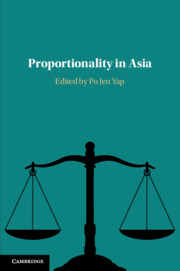Book contents
- Proportionality in Asia
- Proportionality in Asia
- Copyright page
- Contents
- Figures
- Tables
- Contributors
- Acknowledgments
- Abbreviations
- Introduction
- Part I Structured Proportionality
- Part II Anemic / Ad Hoc Proportionality
- 5 Proportionality in Malaysia
- 6 Judicial Review of Restrictions on Constitutional Rights in Japan
- 7 Against the Currents
- 8 Manifest Disproportionality and the Constitutional Court of Thailand
- Part III Doctrinal Equivalents of Proportionality
- Conclusion
- Index
8 - Manifest Disproportionality and the Constitutional Court of Thailand
from Part II - Anemic / Ad Hoc Proportionality
Published online by Cambridge University Press: 18 September 2020
- Proportionality in Asia
- Proportionality in Asia
- Copyright page
- Contents
- Figures
- Tables
- Contributors
- Acknowledgments
- Abbreviations
- Introduction
- Part I Structured Proportionality
- Part II Anemic / Ad Hoc Proportionality
- 5 Proportionality in Malaysia
- 6 Judicial Review of Restrictions on Constitutional Rights in Japan
- 7 Against the Currents
- 8 Manifest Disproportionality and the Constitutional Court of Thailand
- Part III Doctrinal Equivalents of Proportionality
- Conclusion
- Index
Summary
The 1997 Thai Constitution explicitly enshrined a key element of proportionality – necessity – as a normative limitation on any legislative interference in a person’s constitutional rights, a first in the country’s history. Since then, the proportionality analysis (PA) has become one of the most essential grounds used by Constitutional Court in constitutional review. Interestingly, even when the country was governed from time to time by the military and ruled under an interim constitution, this doctrine continued to play a vital role as a general principle of Thai constitutional law.More importantly, in 2018, Constitutional Court recently spelled out, for the first time, three elements of PA – suitability, necessity and proportionality stricto sensu or balancing, emphasizing the significance of proportionality as a fundamental principle of the 2017 Constitution.Nevertheless, to date, while there have been about eighty instances of the Thai Constitutional Court applying PA, only on seven occasions were the laws declared unconstitutional for failing PA.This Chapter therefore argues that in Thailand, a legislative measure will most likely pass the proportionality test unless the law is manifestly disproportionate.
- Type
- Chapter
- Information
- Proportionality in Asia , pp. 192 - 214Publisher: Cambridge University PressPrint publication year: 2020



